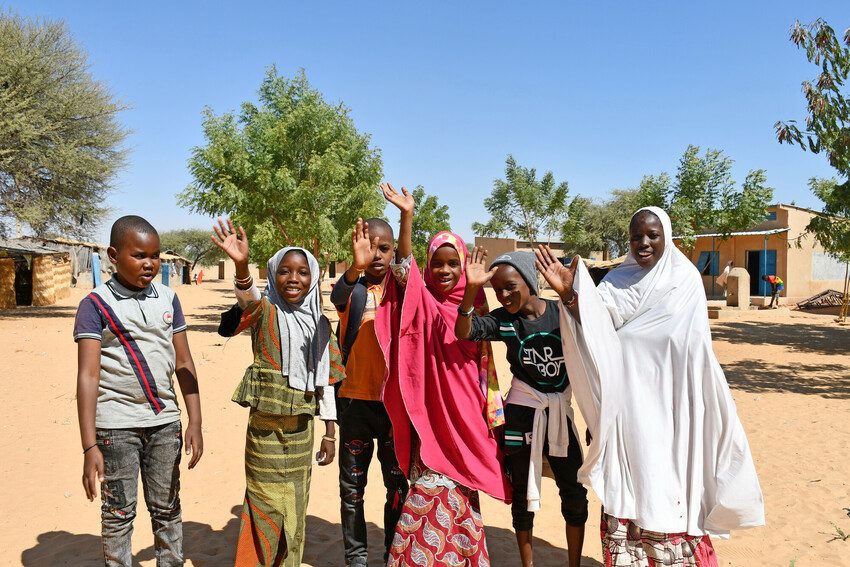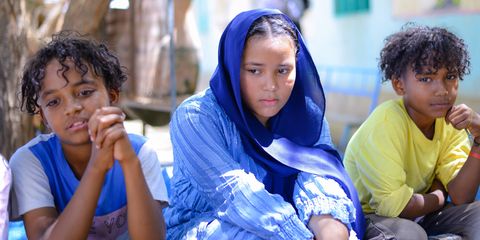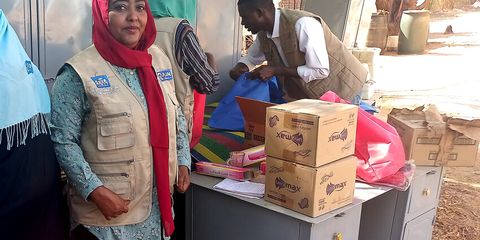Crisis must not stop Sudanese and Chadian children from realising their potential
20 March 2024Sudanese and Chadian children have immense potential, blogs Kristine Anderson, Gender in Emergencies Specialist deployed in Chad. We must not let crisis in the region prevent them from realising it.

“Girls need sanitary pads and soap to keep themselves clean.”
“Girls need schoolbooks and classrooms.”
“Every girl in this camp needs a smartphone!”
“Every girl in this camp needs a smartphone!”
Sitting under a makeshift shelter shielding us from the midday sun in Ourang refugee camp in Eastern Chad, this cheeky joke was not what I was expecting to hear when I asked a group of adolescent girls about their most important needs.
I had been deployed to Plan International’s new country office in Chad as a Gender in Emergencies Specialist and was meeting with Sudanese and Chadian adolescents and women from the camp and surrounding villages to guide Plan’s humanitarian interventions.
The conflict in Sudan has so far killed more than 14,700 people and displaced 8.4 million more inside Sudan and to neighbouring countries like Chad. Sudan is now the world’s largest child displacement crisis with more than 3.5 million children forced to flee their homes and 25 million people in need of humanitarian assistance. Despite the grave situation, I often encountered this sense of humour among girls, pointing to the resilience of adolescents affected by this crisis. Humanitarians have a duty to respect this resilience, and to respond to the challenges children and youth face amidst this conflict and humanitarian crisis.
Takeaways from my mission
Here are a few takeaways from my mission:
Clean water is dangerously scarce – and women and girls are most affected.
Many refugees are currently living in camps and informal settlements without adequate access to clean water, protection, and food. In the parched landscape in Ourang, women and girls line up at water points and walk home under the hot sun balancing heavy jugs on their heads. Girls and women told me that the toilets are so dirty and unsafe in the camp that many people dig their own latrines or are forced to relieve themselves in the open – raising the risk of typhoid, cholera, and other diseases especially deadly to young children.
Girls also described how difficult it is to manage their periods in a safe and dignified manner when there is no clean water or menstrual health supplies, a gap that Plan is filling through distributing menstrual materials and providing essential hygiene information.
Girls shared that they do not feel safe leaving their dwellings and face the risk of gender-based violence when they try to do basic things like go to the bathroom, walk to school, buy food at the market, or gather water and firewood.
Girls and boys of all ages face protection risks – but have few service options
Children face threats to their safety that are shaped by their gender, age, disability status, skin colour, and identity factors. Girls shared that they do not feel safe leaving their dwellings and face the risk of gender-based violence (GBV) when they try to do basic things like go to the bathroom, walk to school, buy food at the market, or gather water and firewood. Girls and boys living with disabilities are at even greater risk of exploitation and harm and are often isolated in the home as there are no specific services for them.
The crisis has taken a toll on the mental health of children
Many displaced people have lost everything and have experienced or been witness to grave human rights abuses. Adolescent boys shared how they struggled to pass the long hours of the day by playing sports or trying to get an Internet connection, while girls pass the time by helping their mothers with domestic tasks and caring for family members.
Both boys and girls crave opportunities to meet with their peers in a positive and safe environment. Despite these needs, protection and mental health support in the camps and host communities is not widely available. Plan International has opened a child- and adolescent-friendly space in Ourang camp offering basic psychosocial support to children and their caregivers, but we desperately need more support from donors to expand these services.
We desperately need more support from donors to expand services.
Adolescent girls and boys have agency, and they demand educational opportunities
Adolescent girls told me how they had loved going to school back home in Sudan, and that they had big plans for their futures that they fear are on hold because of the war. In Ourang camp, there are not currently formal classes for girls and boys past primary level, and younger children attend class crowded onto plastic mats under trees. While Plan and other education actors are responding to this need by constructing temporary learning spaces and training teachers, more resources and efforts are needed to ensure that girls and boys of all ages can realise their potential.
The war in Sudan must end. But the girls and boys affected by the war cannot wait for this – we must support them now to survive and to achieve their potential to contribute to their communities and lead fulfilling lives.
More resources are needed from the international community to meet basic humanitarian needs of the people affected by this massive crisis, and to utilise the talents and ideas of young girls, boys, women, and men to realise a more hopeful and peaceful future.

